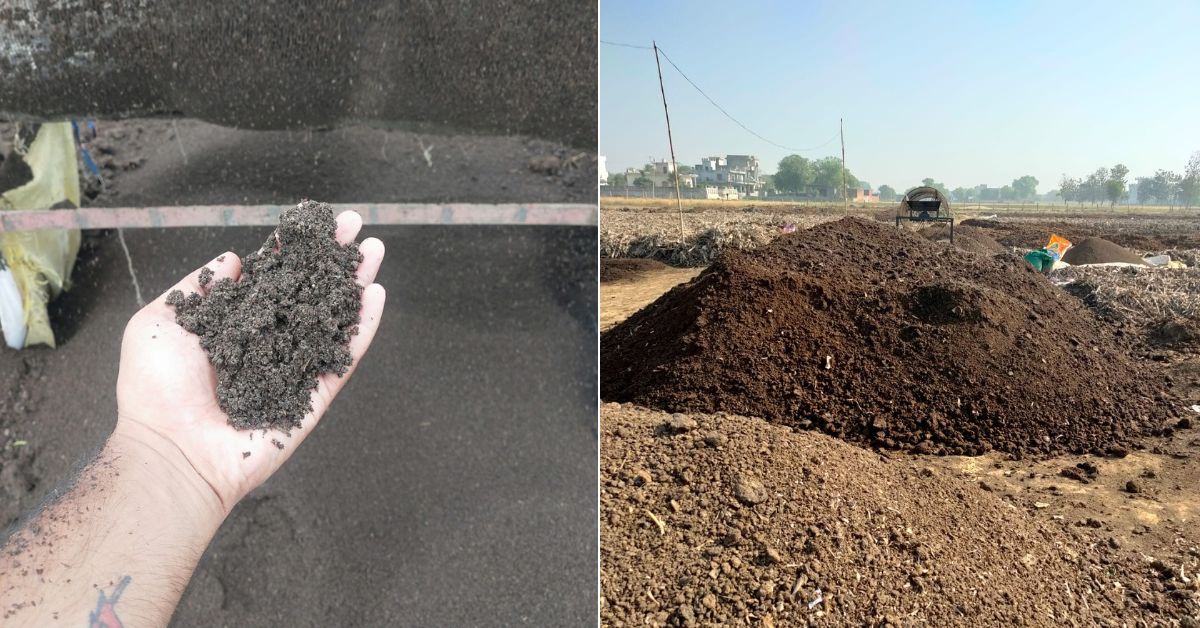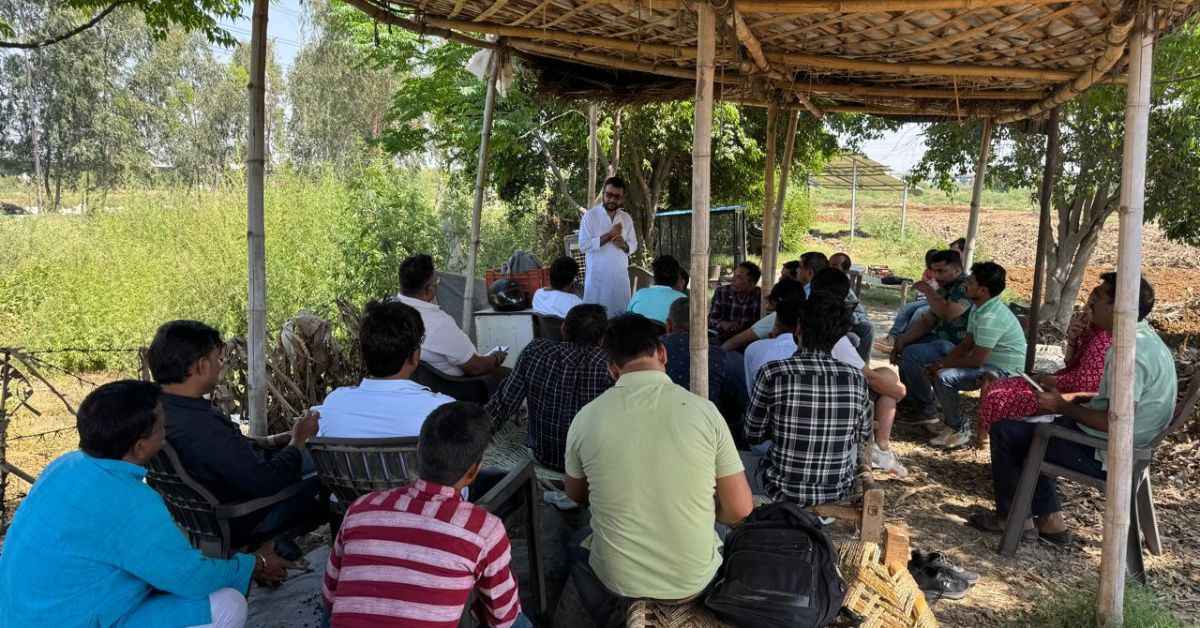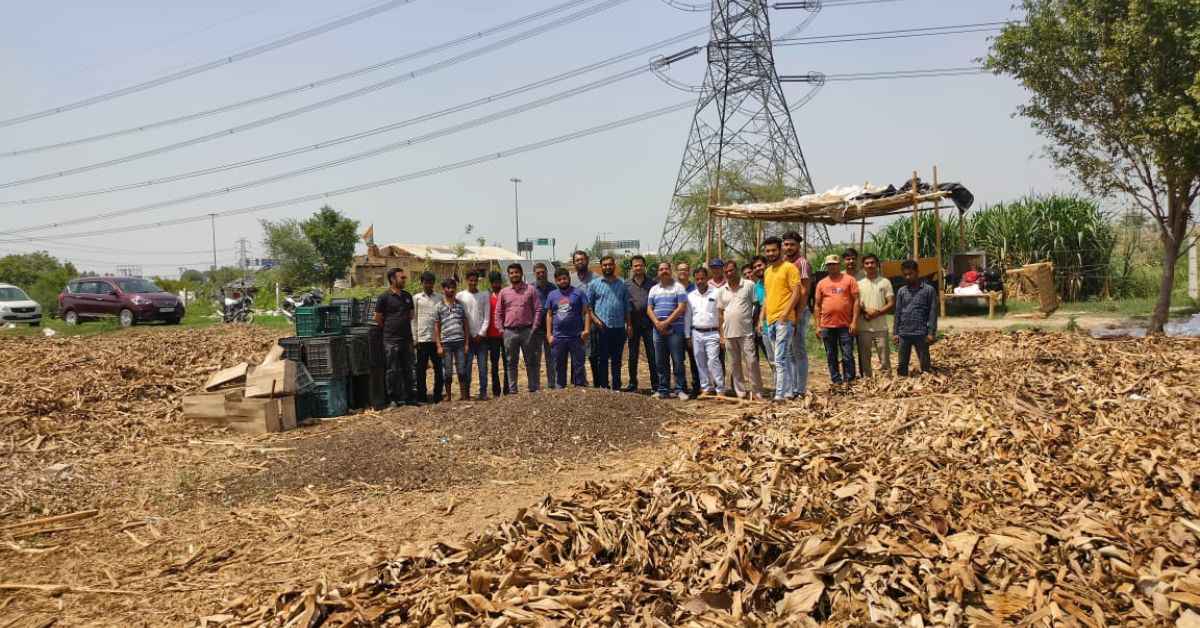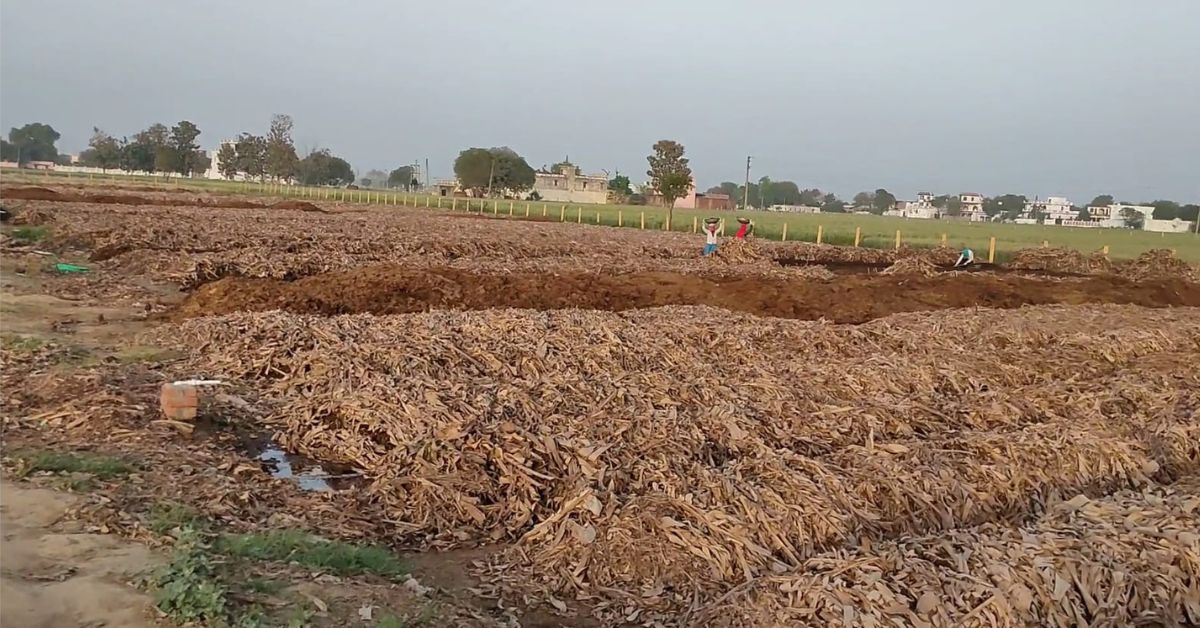From Corporate Cubicle to Compost: How Earthworms Helped This Techie Turn Dung Into a Rs 2.5 Cr Empire
Left his corporate career behind to start a dairy farm – 40 cows in the farm soon expanded to 250 cows, and then the pandemic hit. Losses followed, but 38-year-old Raj Singh didn’t give up; he was brimming with entrepreneurial zeal.
This determination in the dairy farmer made him an innovator and paved wthe ay for his startup ‘Growing Tree Organic Pvt. Limited’.
The Better India sits down with Ghaziabad-based Raj Singh to know more about his journey.
In 2017, Raj started his farm in Ghaziabad, Uttar Pradesh, after he quit his decade-long corporate life. “I wanted to be an entrepreneur, and dairy farming seemed the right way,” he shares.
Starting with 40 cows on seven acres of leased land, his enterprise rapidly expanded to 250 cows. Life seemed predictable — until the world was hit by the COVID-19 pandemic in 2020.
As the pandemic grip tightened, Raj faced a barrage of logistical nightmares. The lockdowns disrupted supply chains, making it nearly impossible for deliveries to reach his customers.
With operational costs skyrocketing, the financial strain became overwhelming. Raj had to confront a heartbreaking reality: shutting down the dairy operations and parting with his cherished cattle to stave off further financial collapse.
“I incurred massive losses of almost ₹60 lakh per month. That’s when I knew I had to change or perish,” he says.
Here’s where the turning point came.
 After losing his savings in the dairy business, Raj Singh pivoted to vermicomposting.
After losing his savings in the dairy business, Raj Singh pivoted to vermicomposting.
In the cascade of adversity, Raj unearthed an intriguing opportunity with cow dung. A byproduct that he once sold at nominal prices, suddenly gleamed with newfound potential.
As Raj grappled with the pandemic’s challenges, he saw cow dung not as waste, but as the cornerstone of a sustainable venture — vermicomposting.
Raj ventured into producing vermicompost, a rich organic fertiliser, harnessing earthworms to transform cow manure into a valuable agricultural resource. This bold pivot didn’t just rescue him from the brink of financial despair — it catapulted him into a thriving new enterprise.
With this epiphany, his startup, ‘Growing Tree Organic Pvt Limited’, was born.
Turning setbacks into stepping stones
After completing his engineering degree in automotive management in 2008 and an MBA in marketing in 2014, Raj delved into the corporate world. “But the corporate sphere, with its stifling routines and constricted atmospheres, left me yearning for something more fulfilling,” he shares.
Fueled by a desire to break free from the monotony and pursue entrepreneurship, and influenced by his ancestral ties to agriculture, Raj had embarked on the venture of dairy farming in 2017. But the necessity of dismantling his dairy operation led Raj to a pivotal realisation.
 Raj’s strategic approach focused on direct outreach to potential clientele.
Raj’s strategic approach focused on direct outreach to potential clientele.
The abundant cow dung, initially a waste product of the defunct dairy business, held significant potential when repurposed into valuable vermicompost.
During his tenure in the dairy business, Raj had noticed that cow dung was often purchased at nominal prices. Unwilling to let such a resource go untapped, Raj began exploring the potential of converting cow dung into vermicompost.
Realising the market demand for organic fertilisers due to an increasing shift towards sustainable and organic farming practices, Raj seized the opportunity to pivot his business.
“Initially, all my savings were consumed in the dairy itself. Nothing was left. On one side, the dairy business was incurring a lot of losses, but we were doing quite well on vermicompost. That balanced everything out. I found a way with vermicomposting,” he adds.
In the wake of his dairy venture’s closure, Raj initiated the production of vermicompost. One of Raj’s innovative strategies involved maintaining the affordability and quality of his vermicompost.
Understanding that his target market was predominantly small-scale farmers, Raj was determined to keep his product cost-effective. Selling vermicompost at competitive rates, sometimes as low as ₹3 per kg, Raj was able to make his product accessible to a larger customer base, ensuring organic farming was an affordable option for all.
Anand Prakash, a farmer from Balia, Uttar Pradesh, has been cultivating crops like garlic, onion, and chillies on his 15 bighas of land. For the past three years, he has been a regular customer of Raj Singh, whom he discovered through YouTube.
 By networking with nurseries, vegetable farms, and polyhouses, Raj was able to build his clientele.
By networking with nurseries, vegetable farms, and polyhouses, Raj was able to build his clientele.
In the past, Anand relied on cow dung fertiliser obtained from local distributors. However, he found that the quality was subpar. “It often contained residue such as bhusa (chaff) and was incompletely decomposed. This lack of decomposition made the fertiliser prone to mites, and to combat these pests, I was compelled to apply chemical pesticides. By using this new vermicompost, I’ve observed that the quality of my vegetables has significantly improved,” he shares with The Better India.
Anand now applies 6-7 quintals of vermicompost per acre during the preparation of the fields. He finds this new approach not only more effective but also economically viable. “Excluding transportation expenses, the vermicompost costs me only ₹4 per kilogram, which is cheaper than the locally sourced alternatives I previously used,” he adds.
Raj’s strategic approach focused on direct outreach to potential clientele. By networking and targeting businesses that already understood the benefits of organic manure — such as nurseries, vegetable farms, and polyhouses — he was able to build a clientele that appreciated the value of vermicompost.
Moreover, Raj differentiated his product by focusing on high-quality standards. His vermicomposting process included allowing ample time of 90 days for full conversion, ensuring a nutrient-rich product. “Usually, people sell vermicompost within 30 days when the dung is not completely decomposed by earthworms,” he adds.
Such emphasis on quality over shortcuts has proven essential, helping Raj build a reputation for reliability and excellence.
Through partnerships with local dairies and organisations, Raj ensures a steady supply of raw materials for vermicomposting, allowing for consistent production levels. His market presence now stretches beyond Uttar Pradesh, with distributors in regions such as Himachal Pradesh, Jammu and Kashmir, and major cities like Bengaluru and Pune.
 Raj uses innovative methods like banana leaves for mulching to boost the composting process.
Raj uses innovative methods like banana leaves for mulching to boost the composting process.
Making vermicompost low cost
Raj’s vermicompost operation is notable for its innovative, low-cost approach to production. One of the key strategies employed is the use of banana leaves for mulching, which plays a crucial role in maintaining the ideal conditions for vermicomposting without incurring high expenses.
“I cover the cow dung pile with a layer of banana leaves. With a width of three to five inches, the layer of leaves effectively creates a honeycomb-like structure over the compost. The use of banana leaves avoids the need for expensive materials like plastic sheets, bricks, or concrete beds. This aligns with my focus on maintaining a zero-budget process,” he says.
“Additionally, the banana leaves help maintain a stable and ideal environment for the worms. They provide complete darkness and regulate moisture levels. Even in the oppressive summer temperatures of Ghaziabad, which can reach up to 45°C, the use of banana leaves keeps the temperature of the vermicompost beds from exceeding 25°C. This cooling effect is crucial for worm survival and efficiency,” he points out.
Raj owns about 500 beds for vermicompost, each yielding more than two tonnes of compost. His monthly production stands at 500 tonnes, selling the vermicompost at ₹4.50 per kilogram. With this, the business generates ₹2.5 crore annually.
Reminiscing about his decision to quit a high-profile corporate career to become an agri-entrepreneur, he says, “The moment I chose farming, I knew I would not receive support from anyone. Everyone questioned my decision to quit the stability of corporate life, but I saw potential in what others saw as waste. Despite hardships, I chose never to regret my decision.”
“I understand and appreciate the challenges and rewards of entrepreneurship. When you’re doing your own business, you’re always motivated. You work 24/7, but it never feels like a burden. I feel liberated,” he adds.
Edited by Vidya Gowri; All images courtesy Raj Singh
News